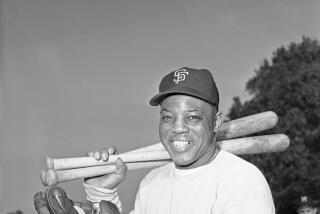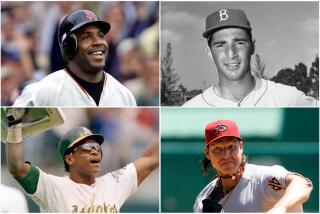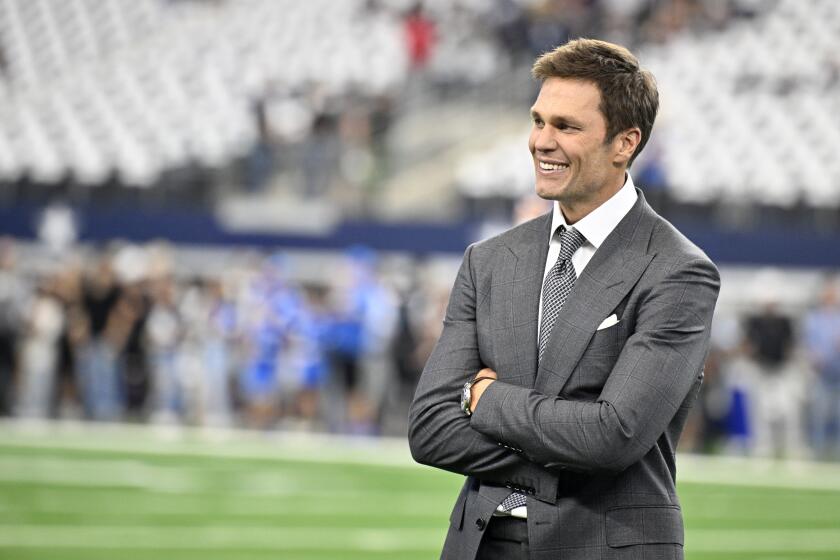THE YEAR OF THE OLD SPORT : There’s No Hero Like an Old Hero for Our Psyche
In the little sport of rodeo, they once had a bucking horse who was either 38 or 42 years old, depending on how late in the evening stories were being swapped.
Either way, he was a legend. Even the guys he bucked were proud of him.
He occupied a place in western lore somewhere between Kit Carson and General Custer.
Ballads were sung about him on one-string guitars. When he died, it was as mournful as a harmonica in a bunkhouse.
It’s supposed to be the era of youth in world history. We’re supposed to venerate the young, distrust the old. Our whole society is geared to it.
Face-lift parlors do a land-office business. Hair dyes, wrinkle-removers, contact lenses all conspire to give the illusion of youth.
It’s a sin to be old in 1986 America. Ancestor worship is out. The past is not prologue, it’s forgotten. It’s an embarrassment.
Lying about your age is a national pastime.
The appearance of youth is paramount. Wear gold chains, go sock-less. Play violent games in the hot sun, jog, pump iron, bicycle.
Maybe the old man with the scythe will be fooled. You’re as young as you feel. Old age is a state of mind. The fountain of youth is under a tennis court. Put on a sweat suit and stay 40 for 20 years.
Shakespeare said it best: “Crabbed age and youth cannot live together. Youth is full of pleasure, age is full of care.”
But George Bernard Shaw was full of defiance. “Youth is such a wonderful thing,” he told us, “that it’s a shame to waste it on the young.”
The poet, Dylan Thomas, advised us not to go gentle into that good night, but to rage, rage, against the dying of the light.
How then can anyone explain the tremendously inspiring national uplift the country went through this year in the major counter-attack on the forces of old age launched by two of our most venerable sportsmen--Jack William Nicklaus and William Lee Shoemaker?
It illustrates once again the truth of the aphorism, to be loved you must be aged.
America loves its heroes. But they must stand the test of time. They must prove themselves over and over again.
America does not love Jim McMahon. John McEnroe. They amuse us, perhaps. Inspire a grudging admiration. But, love? Hardly.
Can you imagine anyone booing Arnold Palmer? Willie Mays? Joe Louis? Jim Thorpe? Jack Dempsey? No, they were loved. They were us .
When a great champion spits in the face of time, brings down the temple on the Philistines, it’s a victory for all of us.
You begin with the proposition that everyone gets old. And everybody knows that.
So, when our surrogate holds back that inevitability for even a short time, it is an affirmation of our own capabilities.
We’re all 25 years younger for a day.
We have nothing to fear!
Look at old Jack up there, sinking these incredibly long putts--without glasses!--and turning back all these fancy young bucks in their magenta slacks and golden locks.
What’s to be afraid of? The best is yet to come. Hand me down my walking cane. I’m going downtown one more time.
See Willie Shoemaker sitting in a starting gate on a horse 51 years younger and next to riders 30 years younger and giving them a riding lesson as he steers an 1,100-pound brute through breakneck traffic to win the Kentucky Derby.
Never mind, That’s my boy, that’s my old man! This race has been won by 15-year-olds, but the oldest to win it was 42.
There is a fitness to these in that they are triumphs of the spirit as well as the skills. These are literally champions of the ages.
No one ever rode a horse any better than Willie Shoemaker or hit a golf ball any better than Jack Nicklaus.
This was a man winning his 8,537th horse race, a man winning his 90th golf tournament (his 71st on the U.S. tour).
I have a friend, Will Fowler, who points out that a candle always gives off its brightest flame, flares into its most brilliant light, just before it goes out.
It’s true. Dylan Thomas would understand. It’s a beautiful rage.
Four days before he left the game forever, Babe Ruth hit three home runs and a single and batted in six runs in one game.
The last home run he would ever hit was also the last major league hit and it was the first ball ever hit over the roof at Forbes Field in Pittsburgh and was the longest one ever hit there and maybe anywhere.
Ruth beat more than a pitcher, he beat the foe of all of us, time.
The great Ted Williams also left the game with a massive home run and, more important, took a batting average that had plunged to .254 in 1959, his 41st year, and brought it up to .316 in 1960.
Stan Musial’s average, plummeting from .351 and .337 in 1957 and ‘58, to .255, .275 and .288 in succeeding years, suddenly flashed up to .330 in 1962, his last full year.
A country rejoiced when a Reggie Jackson, in his 40th year, suddenly lashed out for three home runs in a game. It was like old times.
Age is the common enemy of mankind. Implacable, ruthless, inevitable, it can only lose a battle, never a war.
This is why victories over it are common victories. When our heroes conquer it, we all conquer it.
Hold it at bay for another day and you give hope to every guy who looks in the mirror through bifocals, whose teeth hurt and ears ring and joints ache.
That’s why the world has always loved the Archie Moores, the Dempseys, Ruths. It’s where the phrase “Grand Old Man” came from.
We all want to rage, rage against the dying of the light. They do it for us. And if they can do it, by God, so can we.
More to Read
Go beyond the scoreboard
Get the latest on L.A.'s teams in the daily Sports Report newsletter.
You may occasionally receive promotional content from the Los Angeles Times.










